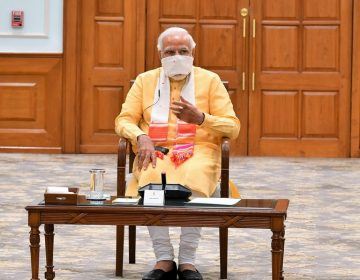Vidya Krishnan in The Atlantic:
 Soon after the Bollywood superstar Amitabh Bachchan tweeted that he had tested positive for COVID-19 and been admitted to a Mumbai hospital, the authorities declared his palatial residence in India’s business capital a “containment zone,” and several members of the Bachchan family were announced to have also tested positive. Bachchan is one of the world’s most recognizable actors, a celebrity with no peer in India, and his health was an issue of national concern. Ultimately, his case was a light one, and he was eventually discharged, allowed to quarantine at home.
Soon after the Bollywood superstar Amitabh Bachchan tweeted that he had tested positive for COVID-19 and been admitted to a Mumbai hospital, the authorities declared his palatial residence in India’s business capital a “containment zone,” and several members of the Bachchan family were announced to have also tested positive. Bachchan is one of the world’s most recognizable actors, a celebrity with no peer in India, and his health was an issue of national concern. Ultimately, his case was a light one, and he was eventually discharged, allowed to quarantine at home.
Yet while the narrow facts of his case appear straightforward, the episode nevertheless spotlights a much broader problem in India: Its coronavirus caseload appears to only be worsening, hamstrung by decades of underinvestment in public health, poor medical infrastructure, and, more recently, a troubling official tolerance of pseudoscience, as well as a growing politicization of health care.
The mere fact that Bachchan tested positive—that he was tested at all—will focus minds in India on the coronavirus pandemic, which has been slowly but surely gathering pace in the country. More than 1.8 million people have so far tested positive, upwards of 48,000 are known to have died of COVID-19, and infections show little sign of abating. Arguably India’s most recognizable celebrity, Bachchan has starred in movies for decades, as have his wife, son, and daughter-in-law, and his high-profile announcement may spur many who were skeptical of getting tested to do so (if they are able) and to take greater precautions: He is quite literally cinematic royalty, some combination of Tom Hanks and Prince Charles (both of whose diagnoses made the virus very real for Americans and Britons, respectively).
More here.
